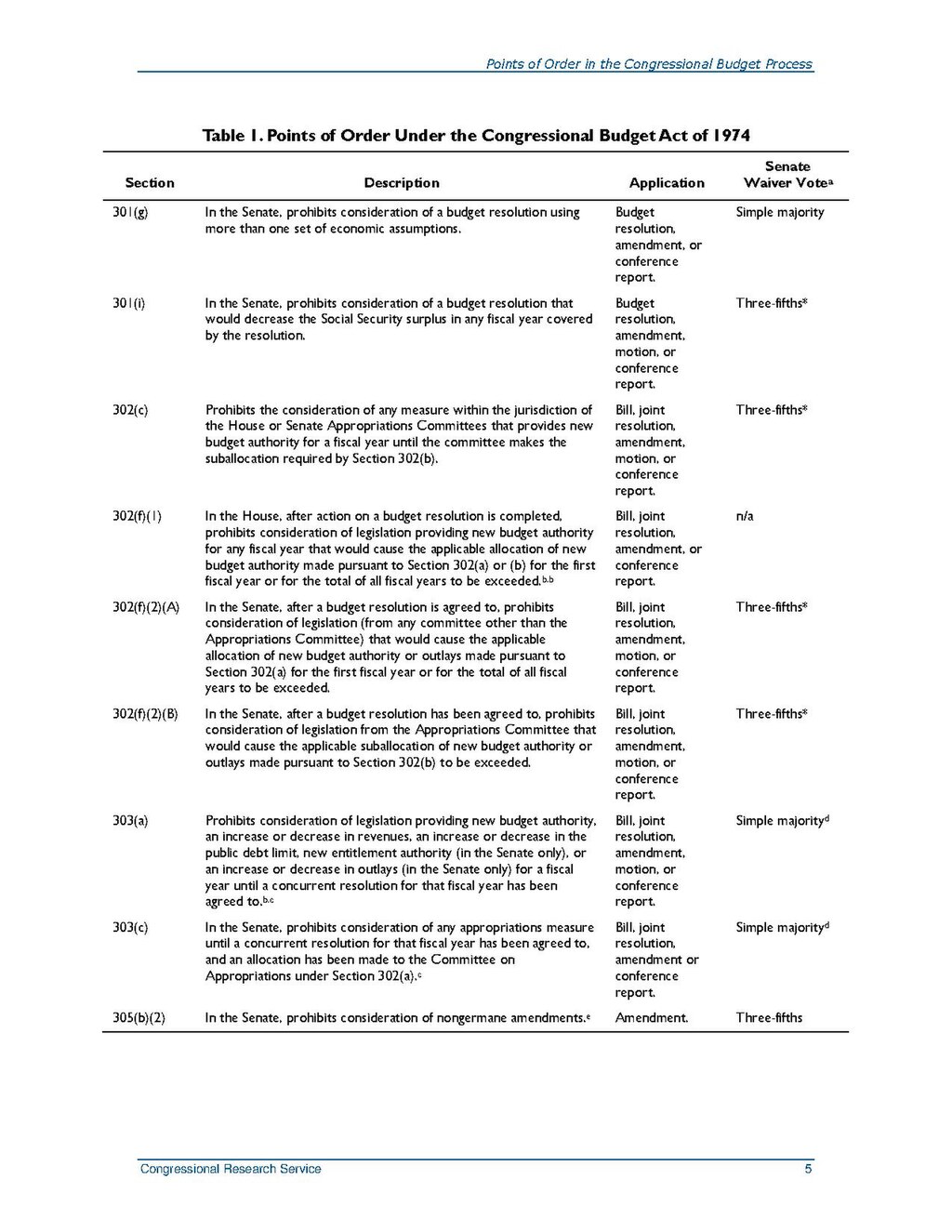Points of Order in the Congressional Budget Process
Table 1. Points of Order Under the Congressional Budget Act of 1974
| Section | Description | Application | Senate Waiver Votea |
| 301(g) | In the Senate, prohibits consideration of a budget resolution using more than one set of economic assumptions. | Budget resolution, amendment, or conference report. | Simple majority |
| 301(i) | In the Senate, prohibits consideration of a budget resolution that would decrease the Social Security surplus in any fiscal year covered by the resolution. | Budget resolution, amendment, motion, or conference report. | Three-fifths* |
| 302(c) | Prohibits the consideration of any measure within the jurisdiction of the House or Senate Appropriations Committees that provides new budget authority for a fiscal year until the committee makes the suballocation required by Section 302(b). | Bill, joint resolution, amendment, motion, or conference report. | Three-fifths* |
| 302(f)(1) | In the House, after action on a budget resolution is completed, prohibits consideration of legislation providing new budget authority for any fiscal year that would cause the applicable allocation of new budget authority made pursuant to Section 302(a) or (b) for the first fiscal year or for the total of all fiscal years to be exceeded.b,b | Bill, joint resolution, amendment, or conference report. | n/a |
| 302(f)(2)(A) | In the Senate, after a budget resolution is agreed to, prohibits consideration of legislation (from any committee other than the Appropriations Committee) that would cause the applicable allocation of new budget authority or outlays made pursuant to Section 302(a) for the first fiscal year or for the total of all fiscal years to be exceeded. | Bill, joint resolution, amendment, motion, or conference report. | Three-fifths* |
| 302(f)(2)(B) | In the Senate, after a budget resolution has been agreed to, prohibits consideration of legislation from the Appropriations Committee that would cause the applicable suballocation of new budget authority or outlays made pursuant to Section 302(b) to be exceeded. | Bill, joint resolution, amendment, motion, or conference report. | Three-fifths* |
| 303(a) | Prohibits consideration of legislation providing new budget authority, an increase or decrease in revenues, an increase or decrease in the public debt limit, new entitlement authority (in the Senate only), or an increase or decrease in outlays (in the Senate only) for a fiscal year until a concurrent resolution for that fiscal year has been agreed to.b,c | Bill, joint resolution, amendment, motion, or conference report. | Simple majorityd |
| 303(c) | In the Senate, prohibits consideration of any appropriations measure until a concurrent resolution for that fiscal year has been agreed to, and an allocation has been made to the Committee on Appropriations under Section 302(a).c | Bill, joint resolution, amendment or conference report. | Simple majorityd |
| 305(b)(2) | In the Senate, prohibits consideration of nongermane amendments.e | Amendment. | Three-fifths |
Congressional Research Service
5
